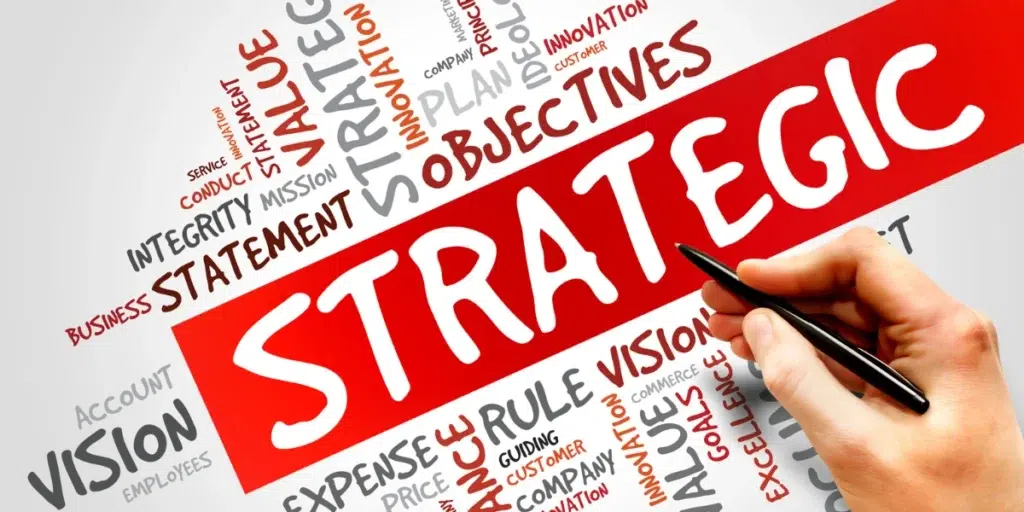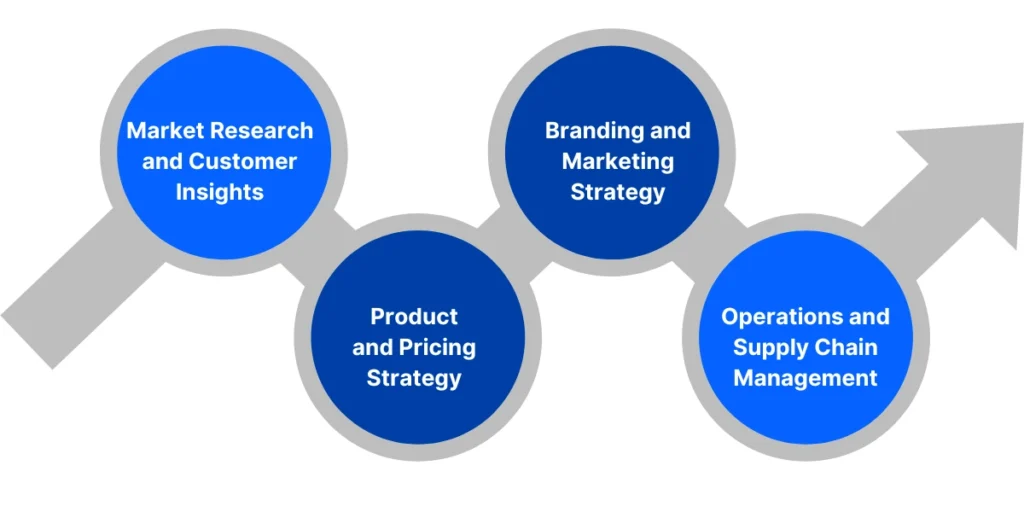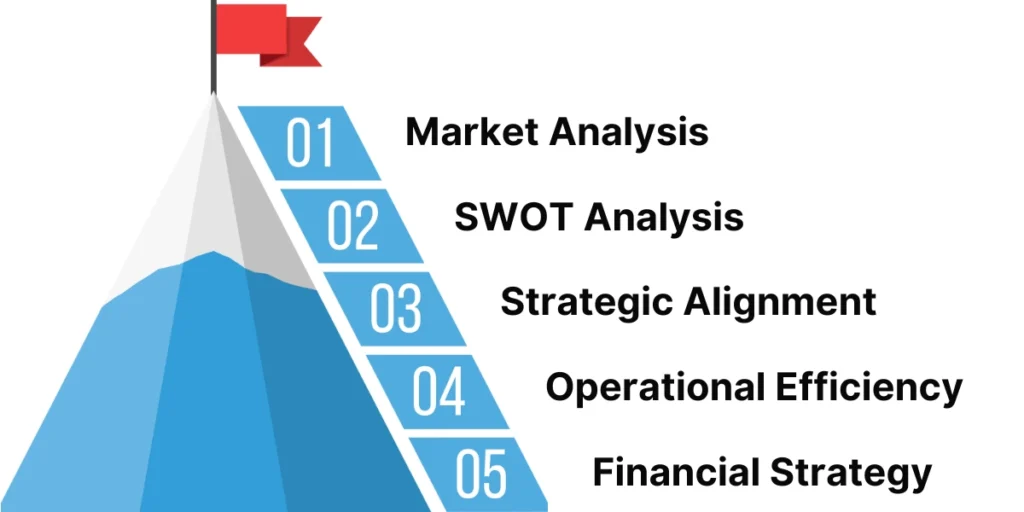Starting and running a retail store can be exhilarating, yet challenging. The retail landscape is ever-evolving, with new technologies, shifting consumer behaviors, and increasing competition.
As a retailer, your store’s success depends on more than just offering the right products at the right prices. It requires careful thought, planning, and strategic foresight. This is where strategic planning in retailing comes in.
Strategic planning in retailing is a vital process that helps retail businesses map out their goals, align their strategies, and achieve success in an increasingly competitive market.
Without a well-defined strategy, even the most well-equipped retail businesses can flounder. That’s why partnering with a business consulting firm can be an invaluable asset in ensuring that your retail business stays ahead of the curve.
In this blog, we will explore how effective strategic planning in retailing can transform your store’s success and why it’s essential to have expert guidance from strategic planning services to make informed decisions.
Table of Contents
ToggleWhy Strategic Planning is Key for Retail Success

Strategic planning in retailing is more than just creating a business plan it’s about developing a comprehensive, long-term approach to success. Without a clear strategy, retailers may struggle to understand their target market, develop relevant products, or implement efficient operations.
- Align goals with action: It connects your business objectives with the right tactics to achieve them.
- Navigate market challenges: A well-planned strategy helps anticipate potential obstacles and prepares your business for unexpected changes in the market.
- Enhance decision-making: With clear goals and data-driven insights, you can make informed decisions that support your long-term objectives.
- Increase profitability: Strategic planning helps optimize operations, marketing, and sales processes to drive better returns.
The Core Elements of Retail Business Strategy

To successfully implement strategic planning in retailing, there are several core elements that need to be considered. Each component should work together to reinforce the overall strategy, ensuring consistency in execution and measurable results.
- Market Research and Customer Insights: The foundation of any retail strategy is understanding your target market. Conducting thorough market research allows you to gain deep insights into customer preferences, buying behaviors, and needs. This information helps your offerings to meet market demands, ensuring a strong product-market fit.
- Product and Pricing Strategy: Your product offerings and pricing model should align with consumer expectations and market trends. By offering the right mix of products, retailers can differentiate themselves in a crowded market. Pricing is a critical aspect of this, as it needs to be competitive while still allowing for healthy margins. A well-developed pricing strategy enables retailers to attract price-sensitive customers while maintaining profitability.
- Branding and Marketing Strategy: A strong brand identity creates trust and recognition, which are essential for repeat business. Effective marketing strategies, such as digital marketing, social media outreach, and promotions, help amplify your brand’s presence. Establishing a connection with your audience and creating loyalty will ensure long-term success for your store.
- Operations and Supply Chain Management: Retail operations encompass everything from inventory management to employee training and logistics. Efficient supply chain management helps reduce costs, improve product availability, and ensure a smooth in-store experience for customers. Streamlining these processes should be a key part of your strategic planning in retailing to optimize your store’s operations and create a seamless experience for your customers.
Proven Strategies for Retail Success

Once you have a solid understanding of the foundational elements, it’s time to implement proven strategies that can propel your retail business forward. Here are some effective approaches to consider:
- Customer-Centric Approach: One of the most powerful strategies in retail is focusing on customer experience. By adopting a customer-first mindset, you can enhance service quality, personalize offerings, and create memorable experiences that encourage repeat visits and long-term loyalty. Consider implementing loyalty programs, targeted offers, and improved customer service to keep your customers engaged.
- Utilizing Technology and Data: In the modern retail landscape, leveraging technology and data analytics is essential. From inventory tracking to customer behavior analysis, using tools like point-of-sale systems, CRM software, and data analytics platforms helps streamline operations and makes informed decision-making possible. Analyzing data allows you to identify trends, optimize pricing, and forecast demand to reduce waste and improve profitability.
- Omnichannel Retailing: Today’s consumers want to shop across multiple channels, and your business should meet them where they are. Implementing an omnichannel strategy means providing a seamless experience across physical stores, online shopping platforms, mobile apps, and social media. Customers expect the same level of service and access regardless of the platform, so creating an integrated strategy that allows for cross-channel engagement is key.
How Business Consulting Firms Can Help in Retail Strategic Planning

While creating a strategic plan is crucial, executing it effectively can be a challenge. This is where business consulting firms come in. These experts can provide valuable guidance to streamline your strategy and avoid common pitfalls. A business consulting firm helps identify opportunities, optimize existing processes, and ensure that you are implementing the right tactics to meet your business goals.
Here’s how business consulting services can support retail businesses:
- Market Analysis: A consulting firm can provide in-depth market research and insights into emerging trends, helping you make informed decisions about product offerings and pricing.
- SWOT Analysis: Consultants conduct a SWOT (Strengths, Weaknesses, Opportunities, and Threats) analysis to help you evaluate your current business position and uncover new opportunities for growth.
- Strategic Alignment: Consultants help align your business goals with your day-to-day operations, ensuring that every aspect of your business is focused on long-term success.
- Operational Efficiency: They offer advice on improving your operations, from supply chain management to workforce optimization, to ensure that your business is running as efficiently as possible.
- Financial Strategy: Business consultants also provide financial planning advice, helping you allocate resources effectively and maintain a healthy cash flow.
Key Steps in Developing a Strategic Plan for Your Retail Business

The process of creating a strategic planning in retailing strategy involves several important steps. Here’s a simple roadmap to guide you through the process:
1. Step 1: Define Your Vision and Objectives Start by establishing a clear vision for your retail business. What do you want to achieve in the next 3, 5, or 10 years? Define your long-term objectives, whether it’s becoming the top choice in your industry, increasing market share, or expanding into new locations.
2. Step 2: Conduct a SWOT Analysis Conduct a SWOT analysis to evaluate your strengths, weaknesses, opportunities, and threats. This step helps you understand where you stand in the market and which areas require improvement.
3. Step 3: Set SMART Goals SMART goals are Specific, Measurable, Achievable, Relevant, and Time-bound. Setting clear goals will help you track your progress and stay focused on your objectives.
4. Step 4: Create Action Plans and Allocate Resources Once your goals are established, create detailed action plans that outline how each objective will be achieved. Allocate resources like budget, staff, and time to ensure each initiative is carried out effectively.
Measuring the Success of Your Strategic Plan

After executing your strategic planning in retailing strategy, it’s important to measure its success. Use Key Performance Indicators (KPIs) to track your progress and assess whether your goals are being met. KPIs can include sales data, customer satisfaction scores, inventory turnover, and more.
Evaluating your strategy regularly ensures that your business stays on track and allows for necessary adjustments when challenges arise.
Conclusion:
Strategic planning in retailing is essential for any business aiming for sustained growth and success. By taking a thoughtful, data-driven approach to decision-making, aligning your goals with clear actions, and continuously measuring your progress, you can transform your retail business into a powerhouse.
While strategic planning in retailing can be complex, you don’t have to navigate it alone. Engaging with a business consulting firm for strategic planning services can provide the expertise and support you need to succeed. Whether it’s through market research, operational improvements, or financial strategies, a consulting firm can help you create a roadmap that guides your retail business to long-term success.
Ready to take the next step? Connect with Vicino business consulting firm today and start transforming your store’s future with a well-executed strategic plan!





